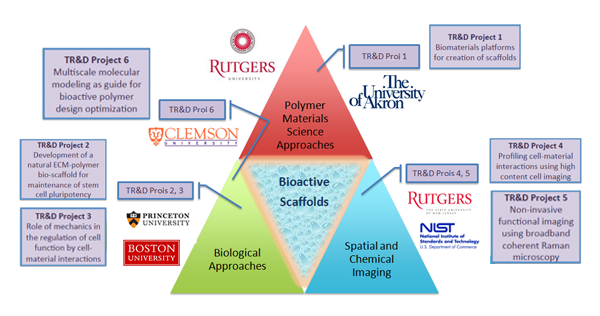RESBIO’s approaches are organized into six interrelated Technology R&D projects (see schematic) that will be executed at Rutgers University, University of Akron, Princeton University, Clemson University, the National Institute of Standards and Technology, and Boston University.
RESBIO is funded to address these major challenges in the development of new polymeric biomaterials:
The slow pace of biomaterials development
The lack of chemical diversity
The need for bioactivity specific to desired cellular responses
The simultaneous optimization of a large number of interconnected parameters and variables.
Currently, new biomaterials are explored one-at-a-time and the biological properties of most biomaterials candidates are never fully characterized. To remedy this situation and to increase chemical diversity of polymers, RESBIO adopts a combinatorial approach to polymer design. To increase the number of materials it can study, RESBIO works toward rapid throughput methods in both synthesis and characterization.
During the first two funding periods, RESBIO successfully developed means to rapidly synthesize and characterize the bioresponse of several libraries of polymers, and also developed empirical, meso-scale and molecular modeling approaches to probe and predict the relationship between material properties and biological responses. This prior work has pointed to potential new ways to impart bioactive properties to materials for specific desired cellular responses and to apply this knowledge to development of stem cell-based therapies.
For further information about opportunities for collaboration, service and training within the RESBIO program, please contact Murat Guvendiren.
